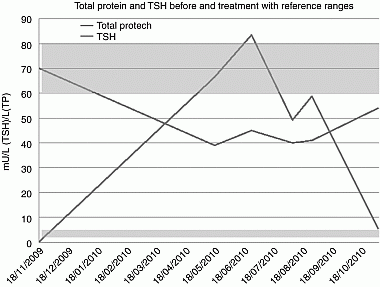SFEBES2012 Poster Presentations Thyroid (52 abstracts)
Unusual cause of elevated TSH levels in a treated primary hypothyroidism
Matt Jenkins , Jaskanwal Sara , Jolly Karan , Tanveer Chohan & Jayadave Shakher
Diabetes and Endocrinology, Heart of England NHS Foundation Trust, Birmingham, United Kingdom.
We present a case of a 52 year old man with a past medical history of primary hypothyroidism on treatment, presenting with elevated TSH levels, suggesting inadequate thyroxine replacement. The patient was managed with 200 mcg of thyroxine for 14 years with no compliance issues. TSH levels failed to normalise despite increasing the dose of thyroxine. In addition to elevated TSH levels the patient noted progressive leg swelling and associated shortness of breath over the preceding 12 months. Examination revealed bilateral pitting oedema up to the abdomen and elevated blood pressure (175/103 mMHg). Initial blood results demonstrated a low albumin of 21 g/L, down from a previous 44 g/L with urinanalysis confirming marked proteinuria (+3) in addition to blood (+2). Subsequently, nephrotic syndrome was investigated as a probable cause. Twenty four hour urinary protein was raised at 12.42 g (normal <0.15 g). A kidney biopsy was performed which demonstrated membranous glomerulonephritis. The nephrotic syndrome was symptomatically managed on frusemide 40 mg BD and ramipril 10 mg OM. The proteinuria improved with reduction of peripheral oedema and stabilization of TSH levels. Discussion: There are numerous causes of elevated TSH levels in a primary hypothyroidism patient on thyroxine. One of the rarer causes is nephrotic syndrome, characterized by oedema, hypoalbuminaemia and proteinuria. Increased glomerular permeability results in loss of thyroxine binding globulin (TBG) and free T3/4. As a result, the pituitary-hypothalamic axis responded by increasing TSH production to compensate for reduced serum T3/4. This elevation of TSH is not responsive to increasing doses of exogenous thyroxine due to urinary loss of TBG. Management is of the underlying nephrotic syndrome. It is important to recognise that many hormones are protein based, as are their carrier molecules.
Declaration of interest: There is no conflict of interest that could be perceived as prejudicing the impartiality of the research reported.
Funding: No specific grant from any funding agency in the public, commercial or not-for-profit sector.

 }
}



